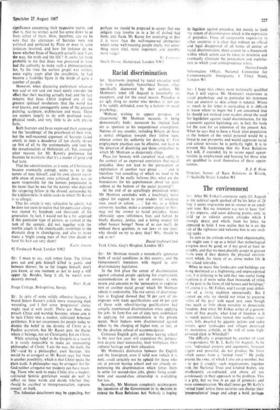Racial discrimination
Sir: Statements inspired by racial prejudice tend to have a peculiarly hypocritical flavour, often specifically disavowed by their authors. Mr Mottram's letter (18 August) is lamentably no exception, and for the -usual reason. Prejudice is aa ugly thing no matter who invokes it; nor can it be validly defended, even by a lecturer in social psychology.
'Without wishing to appear pompous or chauvinistic' Mr Mottram succeeds in being demonstrably both : moreover his implied facts are as spurious as his unquestioned assumptions. Natives of any country, including Britain, do have a moral obligation towards their fellow men; whence comes his authority for denying it? Fair employment practices can be effective, not least in the direction of dissolving just those antipathies to which Mr Mottram so desperately clings.
Pleas for 'honesty with ourselves' read oddly in the context of an expressed conviction that racial prejudice 'does not lead to the persecution or exploitation of another race group . . .' and is therefore 'not something of which we need to be ashamed.' If he really believes this, what are the foundations for his apprehension about 'an alien culture at the bottom of the social pyramid'?
At the end of an appallingly prejudiced letter, Mr Mottram concludes with a touchingly naive appeal for support to your readers 'of whateser race, creed or colour. . . .' Let me, as a fellow university teacher, make a counter-appeal to him: may not the answer to racial prejudice, based ultimately upon selfishness, fear, and hatred, be finally decency, justice, and a loving respect for other human beings? None of us can really do Without these qualities, in our laws or our lives; why should we try to deny that? Why should he ask us to?
David Staflord-Clark York Clinic, Guy's Hospital, London SEI






























 Previous page
Previous page